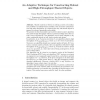Free Online Productivity Tools
i2Speak
i2Symbol
i2OCR
iTex2Img
iWeb2Print
iWeb2Shot
i2Type
iPdf2Split
iPdf2Merge
i2Bopomofo
i2Arabic
i2Style
i2Image
i2PDF
iLatex2Rtf
Sci2ools
145
Voted
OPODIS
2010
2010
An Adaptive Technique for Constructing Robust and High-Throughput Shared Objects
Abstract. Shared counters are the key to solving a variety of coordination problems on multiprocessor machines, such as barrier synchronization and index distribution. It is desired that they, like shared objects in general, be robust, linearizable and scalable. We present the first linearizable and wait-free shared counter algorithm that achieves high throughput without a-priori knowledge about the system's level of asynchrony. Our algorithm can be easily adapted to any other combinable objects as well, such as stacks and queues. In particular, in an N-process execution E, our algorithm achieves high throughput of ( N 2 E log2 E log N ), where E is E's level of asynchrony. Moreover, our algorithm stands any constant number of faults. If E contains a constant number of faults, then our algorithm still achieves high throughput of ( N 2 E log2 E log N ), where E bounds the relative speeds of any two processes, at a time that both of them participated in E and none of them faile...
Related Content
| Added | 14 Feb 2011 |
| Updated | 14 Feb 2011 |
| Type | Journal |
| Year | 2010 |
| Where | OPODIS |
| Authors | Danny Hendler, Shay Kutten, Erez Michalak |
Comments (0)

